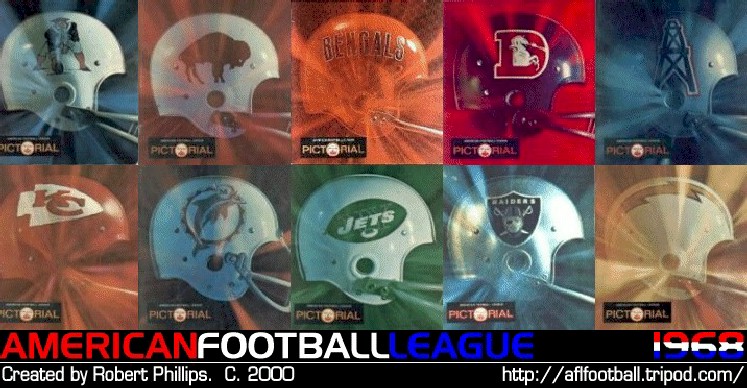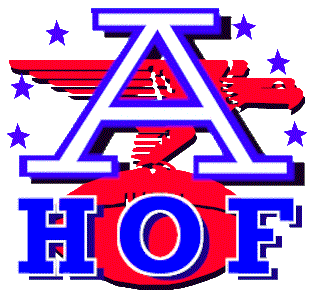|
By Tom Weir, USA TODAY
Last in a series exploring the histories of all
10 AFL franchises as the
NFL celebrates the league's 50th anniversary.
Any historical review of the
American Football League should remember the
Houston Oilers for three things: owner
Bud Adams' wallet, the league's first dynasty and a
relentless willingness to sling the ball.
Adams' oil money was the reason
Lamar Hunt phoned in 1959 with the idea of starting
the AFL to rival the NFL, a long-established league that
nevertheless underserved many markets, including
Texas. Hunt believed his
Dallas Texans and Houston could forge a Texas
rivalry that would help springboard the infant league
into legitimacy.
Adams doesn't get the credit he
deserves as the AFL's co-founder — and remains snubbed
by the Pro Football Hall of Fame, even as his peer Ralph
Wilson gained entry — but it should be noted that the
league's formation was announced in the boardroom of his
company.
The league's first eight owners
were called the "The Foolish Club," because few believed
it would make good on its goal of forcing a merger.
"I said maybe we are," says
Adams, who (like Hunt) had made a failed bid to buy the
NFL's
Chicago Cardinals. "I said we'll find out in a hurry
how foolish we are."
Some think it's a little foolish
that Adams isn't a Hall of Famer, unlike Hunt and the
Buffalo Bills' Wilson.
"They did it together, and I
consider Bud every bit as instrumental as Lamar. He
definitely ought to be in the Hall," says Charley
Hennigan, who became a record-setting receiver on the
Oilers teams that won the first two AFL championships in
1960-61 and lost the third title game in double overtime
to the Texans. (The Oilers did not win another playoff
game until 1978, and they never reached the
Super Bowl while based in Houston.)
Hennigan, 74, embodies much of
what the early AFL, and the Oilers, were all about.
He was 25, had served in the
military and had a wife and two children when the 1960
training camp opened with about 200 candidates fighting
for 33 roster spots.
Hennigan quit a Louisiana
teaching job, telling an angry boss, "I've got to do it,
because I love football."
He taped a pay stub from the
$4,000-a-year teaching job into his helmet and, "I used
that as a motivation tool, to know I'd burned my
bridges." In Houston, he signed on for the grand sum of
$7,500.
His prospects with the Oilers
weren't good, considering he had been deemed too small
for football while trying out at LSU. He also had washed
out during a Canadian Football League audition. But he
showed good speed when he returned to Louisiana and
played for Northwest State, the same school that gave
the 1960 Oilers Charlie Tolar, the 5-6 running back
known as the "Human Bowling Ball."
Fortunately for Hennigan, he was
friends with the biggest name reeled in by Houston —
LSU's 1959 Heisman Trophy winner,
Billy Cannon. In the AFL's first notable bidding war
with the NFL, Adams had signed Cannon by doubling the
offer he received from the
Los Angeles Rams. The owner also ultimately added
his wife's
Cadillac to the deal.
"When we were trying out for the
team, we ran 50-yard dashes instead of 40s, and Billy
would let me win by a half step," Hennigan says of
Cannon. "He's been a friend of mine for years and
years."
Long term, Cannon's generosity
paid off for the Oilers.
Hennigan set an AFL record with
101 catches in 1964, breaking the record of 100
Lionel Taylor set for the
Denver Broncos in 1961.
[The first two players in Professional Football HISTORY
to catch 100 or more passes in a season.]
Hennigan's mark stood until Hall
of Famer
Art Monk had 106 catches for the
Washington Redskins in 1984.
But Hennigan gives equal weight
to his 1961 season, when his 82 receptions for 1,746
yards included three 200-yard games.
The quarterback making all those
throws was
George Blanda, who had retired from the
Chicago Bears after the 1958 season because he was
being used almost solely as a kicker.
Blanda stayed with the Oilers
through 1966, then played for the
Oakland Raiders through 1975. He set the tone for
Houston's air attack, leading the AFL in passing yards
in 1961 and 1963.
His 36 touchdown passes in 1961
were the most by any AFL or NFL quarterback, remaining
the single-season record until
Dan Marino threw 48 in 1984.
"George weighed about 230, and
both of his knees looked like railroad tracks from all
the stitches," Hennigan says. "We had dinner together a
lot, and he knew everything. He was like having another
coach out there, on the field."
Hennigan says that era's emphasis
on man-to-man coverage helped early AFL teams amass
passing yardage. Another factor was that smart receivers
could take advantage of fields that sometimes seemed
like obstacle courses.
Each goalpost was anchored in two
spots, instead of today's "Y" configuration, and the
posts were on the goal line. Receivers could use those
posts to get separation from defenders, the way a
basketball player uses a pick, "and we'd go in and
score," he says.
Also, "sometimes we would grab on
to the goalpost, swing around and go back out to the
corner," Hennigan says.
And in stadiums that were shared
with baseball teams, "sometimes you'd have a pitcher's
mound that you'd work. You'd take the defender over the
mound and lose him, make him run uphill."
Houston's other prolific receiver
in its championship seasons was Bill Groman. In the
AFL's inaugural season, he led all receivers with 1,473
yards, and in 1961 his 17 touchdowns were the most by
any pass-catcher.
Groman went on to be an NFL scout
for 36 years, with several clubs, including the Oilers.
But his AFL career was nearly cut short in 1960 when he
was slow to recover from an injury, displeasing coach
Lou Rymkus.
Groman says his rehab was
curtailed because, "we only had one whirlpool, one of
those old stainless-steel ones. By the time I'd get in,
the thing was ice cold, because I had to wait my turn
behind Cannon and Blanda."
Luckily for Groman, he had been
recommended to the Oilers by an old friend of Rymkus,
Bob Snyder, who had been a Pro Bowl quarterback for
the Bears in the 1940s. "He convinced Lou to wait and
give me a shot," Groman says.
That decision was validated by a
Groman touchdown catch in the first AFL championship
game, which Houston won 24-16 against the
Los Angeles Chargers, who had
Jack Kemp at quarterback. The eight-point spread in
the waning moments was important, too, because the AFL
had the two-point conversion then, unlike the NFL.
In the title game, Blanda milked
his 16 completions for 301 yards, including an 88-yard
touchdown pass to Cannon. Groman had three catches and
Hennigan four.
Like Hennigan, Groman also had
left a teaching job to take his shot at the pros, where
he earned $8,000 his first season.
"The main thing I remember is
just how much fun it was," says Groman, who had played
at Division III Heidelberg in Ohio. "It wasn't so much a
business then as it is now. It was like a family. None
of us made big money, but it was good money."
The Oilers won their first
championship at their home park in Houston, in front of
a crowd of 32,183 at Jeppesen Stadium. Just as the
Oilers moved on after the 1996 season and were
ultimately rechristened the
Tennessee Titans, so has Jeppesen been renamed
Robertson Stadium.
Groman still lives in Houston and
goes to the stadium to watch the
University of Houston's football team and to
remember his Oilers.
The first championship team, he
says, was given small gold footballs with "1960"
embossed on them, instead of championship rings. Adams
corrected that when the team had its 20th reunion, when
he gave the players rings.
Groman, 73, also has championship
rings from 1961 with the Oilers, and from 1964 and 1965,
with Buffalo. He also played for the Broncos in 1963.
"I think I've got more rings than
anybody else from the AFL," he says, but he savors the
memories as much as the awards. He remembers Adams going
around to talk to his players on every team flight and
says that every time Houston played Dallas, "Lamar Hunt
would always come into our locker room after the game."
"We all wanted it to happen,"
Groman says, "and we were all happy to be there." |





